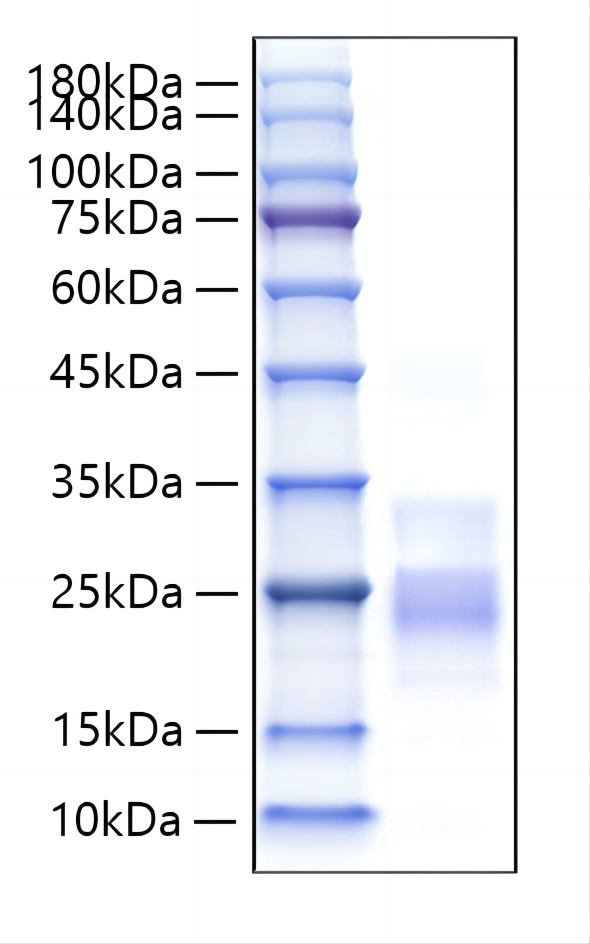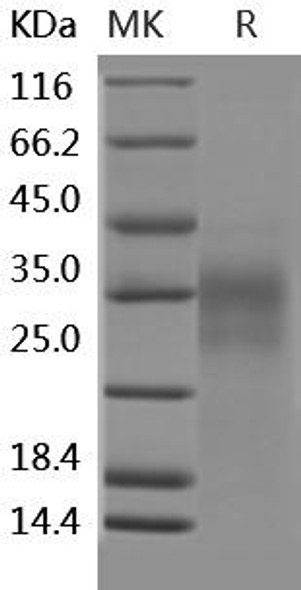Description
Recombinant Mouse TNFSF8/CD30 Ligand/CD153 Protein
The Recombinant Mouse TNFSF8/CD30 Ligand/CD153 Protein is a high-quality recombinant protein designed for murine biological research applications. This protein serves as an essential reagent in mouse model studies, comparative immunology research, and preclinical therapeutic evaluations, enabling scientists to investigate TNFSF8/CD30 Ligand/CD153 biology and its relevance to human disease mechanisms through translational research approaches.
This product (SKU: RPCB1899) is produced using HEK293 cells and features a N-His tag for convenient detection and purification. The protein exhibits a calculated molecular weight of 16.51 kDa with an observed molecular weight of 20-35 kDa under denaturing conditions, achieving ≥ 85% as determined by SDS-PAGE., ensuring exceptional quality and consistency for research applications.
Key Features
| High Purity by Affinity Chromatography | |
| Mammalian & Bacterial Expression Systems | |
| High lot-to-lot consistency via strict QC |
| Product Name: | Recombinant Mouse TNFSF8/CD30 Ligand/CD153 Protein |
| SKU: | RPCB1899 |
| Size: | 10 μg , 20 μg , 50 μg , 100 μg |
| Reactivity: | Mouse |
| Synonyms: | CD153 antigen, CD153, CD30 antigen ligand, CD30 Ligand, CD30L, CD30-L, CD30LCD30 ligand, CD30LGMGC138144, TNFSF8, tumor necrosis factor (ligand) superfamily, member 8, tumor necrosis factor ligand superfamily member 8 |
| Tag: | N-His |
| Expression Host: | HEK293 cells |
| Calculated MW: | 16.51 kDa |
| Observed MW: | 20-35 kDa |
| Gene ID: | 21949 |
| Protein Description: | High quality, high purity and low endotoxin recombinant Recombinant Mouse TNFSF8/CD30 Ligand/CD153 Protein (RPCB1899), tested reactivity in HEK293 cells and has been validated in SDS-PAGE.100% guaranteed. |
| Endotoxin: | < 0.1 EU/μg of the protein by LAL method. |
| Purity: | ≥ 85% as determined by SDS-PAGE. |
| Formulation: | Lyophilized from a 0.22 μm filtered solution of PBS, pH 7.4. |
| Reconstitution: | Centrifuge the vial before opening. Reconstitute to a concentration of 0.1-0.5 mg/mL in sterile distilled water. Avoid vortex or vigorously pipetting the protein. For long term storage, it is recommended to add a carrier protein or stablizer (e.g. 0.1% BSA, 5% HSA, 10% FBS or 5% Trehalose), and aliquot the reconstituted protein solution to minimize free-thaw cycles. |
| Storage: | Store at -20℃.Store the lyophilized protein at -20℃ to -80 ℃ up to 1 year from the date of receipt. After reconstitution, the protein solution is stable at -20℃ for 3 months, at 2-8℃ for up to 1 week. |
CD30 Ligand (CD30L)/TNFSF8 is a type II membrane protein belonging to the TNF superfamily. CD30L is expressed on the cell surface of activated T cells, B cells, and monocytes. The protein is also constitutively expressed on granulocytes and medullary thymic epithelial cells. The specific receptor for CD30L is CD30/TNFRSF8, a type I transmembrane glycoprotein belonging to the TNF receptor superfamily. CD30 was originally identified as a cell surface antigen of Hodgkin's and Reed-Sternberg cells using the monoclonal antibody Ki-1. CD30 is also expressed on different non-Hodgkin's lymphomas, virus-infected T and B cells, and on normal T and B cells after activation. Among T cells, CD30 is preferentially expressed on a subset of T cells producing Th2-type cytokines and on CD4+/CD8+ thymocytes that coexpress CD45RO and IL-4 receptor. CD30 ligation by CD30L mediates pleiotropic effects including cell proliferation, activation, differentiation and cell death by apoptosis. CD30 can act as a costimulatory molecule in thymic negative selection and may also play a critical role in the pathophysiology of Hodgkin's disease and other CD30+ lymphomas.







